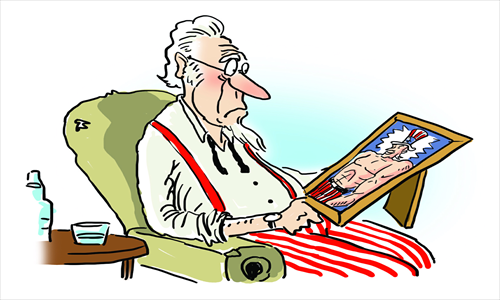US experts are learning humility in once-triumphalist China predictions

Archaeologists and historians quarrel over civilizations long past as if they had themselves experienced the distant events they seek to interpret. Predicting the future course of relations between China and the US is a risky venture in prophecy. We might learn caution from the histories and memoirs of the Cold War between the US and the Soviet Union, which perpetuate the deep divisions within and between the antagonistic nations.
By the end of the Cold War between the US and the Soviet Union, none but the most cynical pretended to believe what each side said about itself.
I am reminded of a cartoon depicting two border guards of the extinguished Communist German state, standing on the Berlin Wall. One, with binoculars, asked the other: "Look at that bearded demonstrator. Is he on their side, and a courageous friend of peace? Or is he on ours, and a dangerous enemy of the state?"
The US foreign policy elite is by no means uniform in its views. Even generational differences are far from unequivocal.
Some of the older elite cling to memories of unchallenged superpower status. Others, sobered by recollections of the 1975 departure from Vietnam, or the fate of servants like Hosni Mubarak, openly warn against illusions of domination. Some of the young are naïve enough to think that they can make the world anew, others are uncertainly hesitant.
One lesson from the period of antagonistic coexistence with the Soviet Union is how poorly the US leadership was served by the prevalent assumptions of the period. The development by what was then West Germany of a role as mediator between the superpowers was expected by literally no one in the foreign policy apparatus. European popular protest at the stationing of US nuclear forces in Germany, Italy, the UK, was equally unexpected.
The US has bankers and business persons, government officials, and scholars with excellent knowledge of China and Asia.
It does not follow that they are immune to mistakes, or that they will be listened to when and if they challenge the dogmatism and rigidity of official opinion.
What has characterized our foreign policy elite since the initiation of modern US power in 1898 is its lack of mastery of complexity and its capacity for persisting in tactical and strategic errors.
It is unclear that wisdom and perseverance will mark the implementation of the loudly announced new US policies in Asia. They are, moreover, not that new. They could intensify previous attempts to "contain" China. They are also bargaining positions in our own never-ending domestic political contests.
Comparisons of US policy toward China with the US Cold War with the Soviet Union are not all that useful. The complex history of US relations with China tells us that no simple explanatory scheme will suffice.
China and the US, and the rest of the world, have changed profoundly. In the EU, major nations are approaching ungovernability. The US is clearly not immune from the disorders of contemporary democracy, disorders which might have major effects on foreign policy.
China itself has new and large opportunities for exercising international influence as in its de facto grouping with Brazil, China, India, Russia and South Africa. China's direct influence on the US is limited but its scope for indirect action is large. China's concern with future US policy is understandable.
Large Chinese apprehension about the future course of US policy is unnecessary. Sooner rather than later, the US elite and public consciousness will awaken to our altered situation.
The tone and temper of the recent visit by US Secretary of State John Kerry to Asia was devoid of the usual US triumphalism. The US military leadership is quite realistic about the limits on US power.
It would be in the shared interest of both nations and of the world community as a whole were China to cultivate US interlocutors seeking an open and stable future.
The author is professor emeritus of Georgetown University Law Center. opinion@globaltimes.com.cn